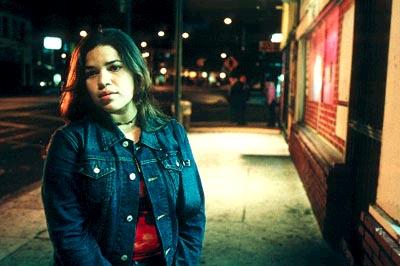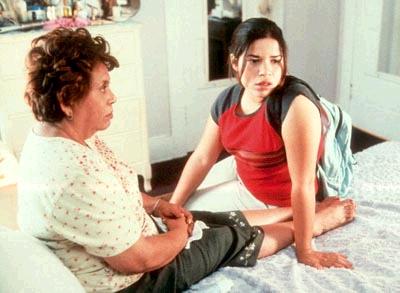

There are not enough minorities represented in film today. Of the few that make it on screen, there are fewer portrayed in a non-stereotypical manner. For Latinos, this means that usually they are maids, migrant workers, or gang members. This is why a movie like Real Women Have Curves is so interesting. It portrays a Latino family in a rich, vibrant manner with three-dimensional, fully developed characters and true-to-life situations. Its fans include both critics and audiences; it won the Audience Award and a Special Jury Prize at the 2002 Sundance Film Festival (both well deserved). At its heart, Real Women Have Curves is about two interconnected things, teenage rebellion and a generational culture clash, and familial expectations.
The heart of the story revolves around Ana Garcia (America Ferrera), a high school graduate. She studied hard through high school, and is smart enough to get a scholarship into college, something that her teacher Mr. Guzman (George Lopez, Bread and Roses, Tortilla Heaven) is trying to encourage. Ana's mother Carmen (Lupe Ontiveros, Storytelling, Gabriela) is strictly opposed. She doesn't want to break up the family, and wants Ana to help her sister Estela (Ingrid Oliu, Flatliners, Stand and Deliver) in her clothing factory. Ana and Carmen do not have the best of relationships. Carmen expects Ana to put her family first, while Ana, raised in America, wants to go her own way. Ana sees the way of her family as backwards. She is smart, she can go to college, she wants something better.
The other overriding issue in Real Women Have Curves is that of weight. Ana and Carmen are both overweight, and Ana resents her mother's continual beratement over this fact. Ana's relationship with her new boyfriend Jimmy (Brian Sites, The Newman Shower, Destiny Stalled) begins to change things. He helps cement Ana's feelings that she is beautiful, and that her weight is okay and part of who she is as a whole. Real Women Have Curves is adapted by George LaVoo (Frisk) and Josefina Lopez from her play. Part of what makes it so complex is the refusal to pigeonhole Ana or Carmen as the good guy or bad guy. Both have good and bad qualities about them. Both truly love each other, but don't quite understand how to express this love. For all her rage at her mother, Ana does work in the factory, and the reason that Carmen harps on Ana so much is that she wants her to attract a husband. The high point is when director Patricia Cardoso (The Kingdom of Heaven, The Water Carrier of Cucunuba) has all the factory workers affirm their beauty by stripping down and working in their underwear. It brings a marvelous feeling of freedom to the movie and its characters.
Ontiveros and Ferrera also give fiery, passionate performances. Ferrera in particular, in her first role, is able to achieve a balance between rebellion and a sense of resignation. She has the ability to change her life, but is not sure whether she can or not. Ontiveros is always able to breathe a sense of gravitas to her roles. As an actress, she easily commands the screen and it's great seeing her get roles that are worthy of her ability. As Carmen, she is struggling to hold to the way of life that is familiar to her. She is doing her best as she knows how. Besides, any movie that includes Ozomatli in its soundtrack deserves to be seen.